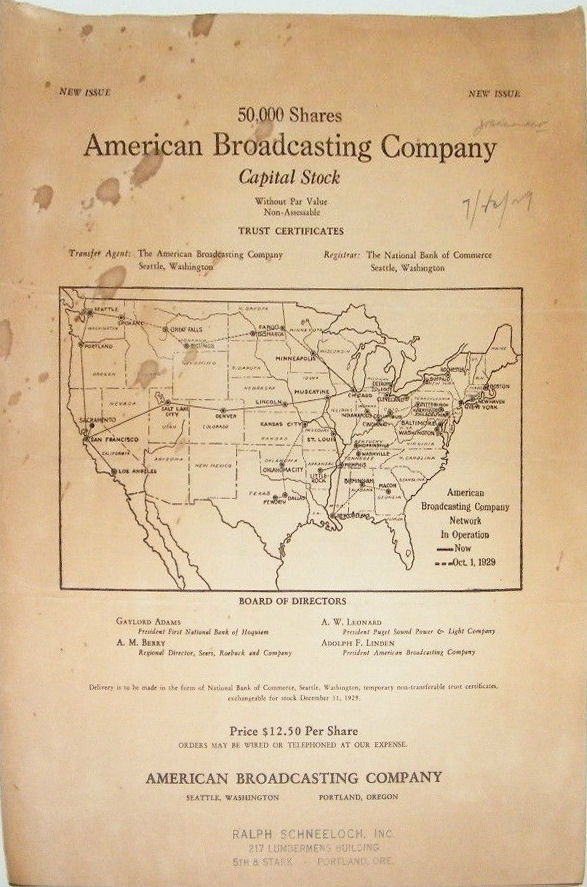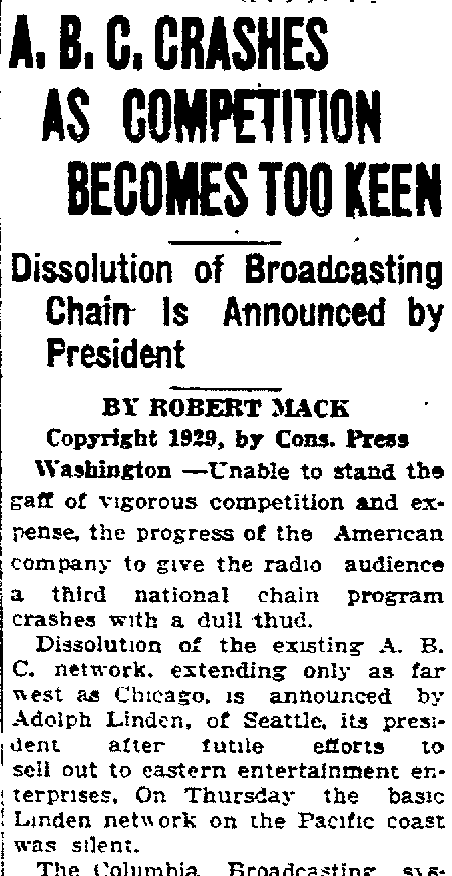America's history through the lens of 20th century broadcast media
Copyright 2020 Greenstone Media Consulting, LLC
American Broadcasting Company - Seattle - 1929
Funding the ABC Network
Click image to see a reproduced version of the Stock Offering announcement
ABC's announced station expansion for Fall, 1929
Appleton (WI) Post Crescent, August 26, 1929 (click for complete article)
Other funding for ABC's network's
operating costs was imperative
and Linden turned to the Puget Sound Savings and Loan Association -- but not for a
formal loan. Accounts differ about those transactions. Linden later claimed that
the transfer of funds from the bank to the ABC was entirely proper and consisted
of loans which were recorded on the bank’s books even if those loans were
irregular in not having been vetted in the customary manner by loan offers. Others
claims that the monies were “skimmed” before they ever got onto the bank’s
books. In any event, it was cash from Puget Sound Savings and Loan that was
keeping ABC’s expensive operation afloat in late 1928 and through the first half of
1929 (which was when ABC was dramatically expanding its network with new
affiliation agreements being signed with midwestern and eastern stations).
By the summer of 1929 ABC was clearly in financial trouble. Given Columbia’s
announcement that it was abandoning its release of its programs over ABC
effective January 1, 1930, one of ABC’s secure sources of revenue would also
disappear within months.
The degree to which the October, 1929 stock market crash contributed to ABC's
implosion is open to debate although the ABC clearly faced serious financial
problems as early as June, 1929.
Linden must have seen the handwriting
on the wall with cash needs rapidly
exceeding sources of funds by the early
summer – just at the time the network
was rapidly expanding its affiliated
station base. On June 1 stations in
Lincoln NE, Kansas City MS, Muscatine
IA, St. Louis MS, Minneapolis-St Paul MN
and Chicago IL all joined ABC and July
15 affiliations with another four cities
were announced.
The network was achieving believability in its quest for
national coverage.
But with finances increasingly shaky, the ABC issued a
prospectus for a stock sale in June, 1929. On its face, the
network appeared to be doing well in pursuing Linden’s goal
for a transcontinental network rivaling NBC and CBS and he
seemed to be in some good company. For example, the
stock prospectus indicated that solid Seattle citizens were
serving on the ABC’s board of director. Among them was A.
W. Leonard, the president of Puget Sound Power and Light
Company, who was also the vice-president of Seattle’s
Totem Broadcasters.
While ABC’s expenses were extremely high and had to be floated with funds taken
from the bank, Linden must have thought he could ride out the wave until ABC’s
eastern affiliates were in place and having a truly transcontinental network would
bring new sponsors to the rescue. And he must have hoped that the stock sale
launched in June would bring in new capital. Moreover, he’d been draining funds
from the Bank for several years with seeming impunity so reliance on continuing to
service ABC’s cash needs with bank withdrawals might have seemed a reasonable
gamble.
But it was too late. In August, Puget Sound Savings and
Loan filed for bankruptcy on discovery of the funds
diverted to the ABC. That shut off the only significant
stream of funding which had been sustaining the
network. The discovery also revealed that Linden had
also used bank funds to finance his original loan to
Vincent Kraft that preceded his acquiring control over
KJR and KYA. With ABC’s bills going unpaid, including
staff salaries and $90,000 in charges due to Pacific
Telephone and Telegraph for the telephone lines which
connected the stations, the network’s troubles made
national news. The press reported that ABC’s demise
was imminent. James Stevens, who had been hired to
write "The Histories of Paul Bunyan" for $50 per script,
reportedly had to sue for payments due him.
By September the ABC had crashed. Linden announced
the network’s failure and control of its assets were
handed over to a court-appointed receiver.


.png)


